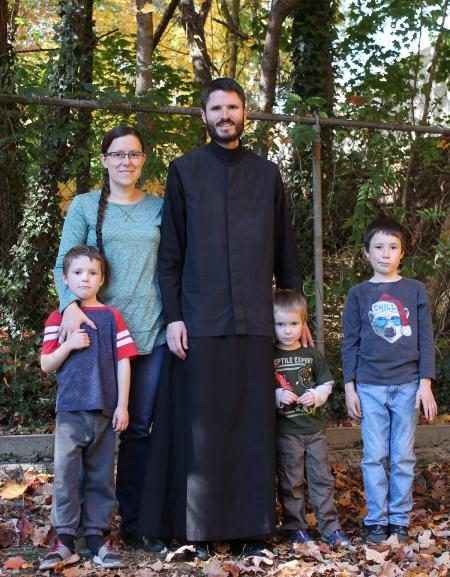God is Greater than our Hearts, by St Vladimir’s Seminarian Dn Silouan Parchert, was chosen as the winning entry of the 5th Annual St Matthias Merit Scholarship Essay Contest. The anonymous donors who sponsor the contest each year asked participants to reflect on the potential issues that arise from modern parenting trends towards a “friend” relationship with their children, as opposed to the more traditional “authority figure” relationship. Respondents were asked to discuss the implications of both parenting styles, and to consider what kind of counsel they might give if asked for advice on this matter in the future, in light of the Holy Apostle and Evangelist John’s instruction to know that “God is greater than our hearts” in 1 John 3.18–20.
God is Greater than our Hearts
What is our ultimate aim for our children? Do we want them to be hard-working and productive members of society as adults? Or better yet, do we want them to be saints? And if we desire sanctity for our children, as all Christian parents should, how do we foster and facilitate growth in Christian virtue? All discussion of parenting must begin with these fundamental questions. It is only with the end in mind that we can properly begin to discuss questions of Christian parenting.
No one would argue that limitations are necessary for daily living. Most adults have responsibilities and therefore make sacrifices for higher purposes, beyond immediate desires. For the Orthodox Christian, asceticism–the practice of self-denial–is how we attain purification from passions and communion with Christ. According to Orthodox parenting expert Dr. Philip Mamalakis, “[w]e venerate our children as icons of Christ by respecting them as persons as we set limits with them.” If we want our children to be saints, then restrictions aren’t optional; they are necessary for the acquisition of virtue.
Some freedom and leniency is also necessary for children, the degree to which will depend largely on maturity. Children need to practice virtue as an act of free will. If we, as parents, overly restrict our children, then we deprive them of opportunities to act generously, kindly, lovingly, etc. Virtue needs to be trained, and not coerced.
It is here that we get to the heart of an important pastoral question: How much stock should we put in being liked or friended by our children? It is important to remember that children are not given to us for our fulfillment. Even if we work at maintaining a peaceful household in accordance with St. Paul’s exhortation (Rom 12.18), we shouldn’t expect that our children will always be friendly with us; to demand such is narcissistic on our part.

Even with the recognition that good parents set boundaries, lead by virtuous example, and honor free-will, there is real pain when our children turn away from us. Parents can take solace in 1 John 3.20: “For if our heart condemns us, God is greater than our heart, and knows all things.” In other words, if we experience pain because of our children’s rejection, God is greater than our pain, and He understands our intentions. Children will break our hearts by rebelling and acting in ways contrary to the Gospel and our wishes. Christ knows our pain, and he knows rejection. He knows the pain of giving His very life as an offering, only to be betrayed and abandoned. If we align ourselves with our Savior, then we, as parents, can be strengthened as we set limits, model virtue, honor freedom, and above all pray for our children. Lord, give us strength!
Dn Silouan is a first-year seminarian in the Master of Divinity (M.Div.) program at St Vladimir’s Seminary, and is projected to graduate in May 2025. He was ordained a deacon in July 2020, after completing the OCA Diaconal Vocations Program. All Saints of North America Orthodox Church, in Albuquerque, NM is Dn Silouan’s home parish; he is currently attached as a deacon at Three Hierarchs Chapel on the St Vladimir’s Seminary campus. Dn Silouan and his wife, Mat. Emilia, have three children, Colin, Brendan, and Sebastian.
1 Philip Mamalakis, Parenting Toward the Kingdom: Orthodox Christian Principles of Child-Rearing
(Chesterton, IN: Ancient Faith Publishing, 2016), 37.